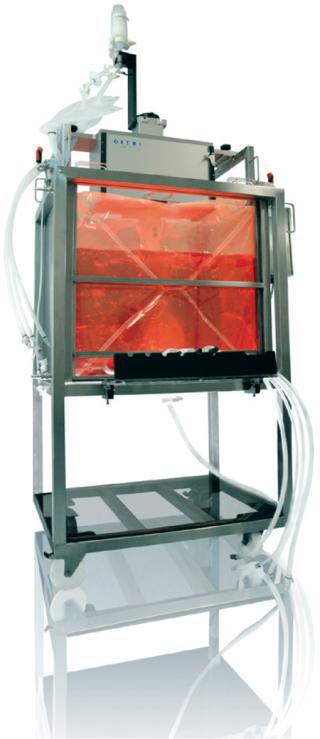SoloHill Microcarriers in a 25-L PadReactor™ Single-Use BioreactorSoloHill Microcarriers in a 25-L PadReactor™ Single-Use Bioreactor


The purpose of this study was to demonstrate compatibility and performance of SoloHill’s Collagen-coated microcarriers in ATMI Lifesciences’ Integrity™ PadReactor™ system. The solid polystyrene core of the collagen microcarriers prevents absorption of serum or cell products into the core of the microcarrier, and the 1.03 specific gravity and 125- to 212-μm diameter allows them to be maintained in suspension with gentle low stirring speed. These solid microcarriers provide an excellent substrate for cell growth. They can be sterilized by autoclaving at temperatures up to 131 °C or by gamma irradiation at doses of 25–40 kGy with no deleterious effects on function.
Microcarrier Mixing
SoloHill microcarriers with a relative density of 1.03 exhibited an optimal distribution between 30 and 50 rpm. At these speeds the PadReactor’s mixing performance was very high, and therefore these conditions were chosen for subsequent cell growth studies.
Bioreactor Culture
Microscopic examination of a representative sample retrieved from the bioreactor one hour after culture initiation revealed that cells had attached and begun to spread onto >90% of the microcarriers. On day 1, it was apparent that cells had begun to grow on ∼ 90 % of the microcarriers. By 72 hours, most microcarriers were confluent; and at day 7, Vero cells had grown 5.9 generations, reaching a cell concentration of 11.2 × 106 cells/mL. Glucose concentration was maintained with perfusion through day 6. The decline in glucose levels measured on day 7 was due to terminating medium perfusion on day 6.

Serial Passage
To demonstrate the feasibility of serial passaging high-density cultures, Vero cells harvested from an aliquot of the entire bioreactor culture were used to seed a 250-mL spinner containing fresh collagen microcarriers. Viability of this cell suspension was 98%, and cells efficiently attached and spread on microcarriers when seeded into the spinner. A conservative estimate using cell numbers obtained from the bioreactor sample indicate that this 15-L culture could be used to seed at least one 300-L bioreactor containing an equivalent microcarrier concentration of 30 g/L providing a split ratio of 1:20. This estimate assumes an 80% cell recovery obtained from the entire bioreactor contents during harvesting.
Monitoring spinner cultures seeded with bioreactor-derived cells revealed that the cells attached and spread on over 90% of the collagen microcarriers one day after seeding and by 72 hours had grown to near confluence.
Conclusions
The results reported here demonstrate compatibility and performance of SoloHill’s collagen microcarriers in an ATMI LifeSciences’ PadReactor disposable bioreactor. In addition, the data show cells derived from high-density culture can be serially passaged to fresh microcarriers for cell expansion.
The results obtained here lay the foundation for subsequent studies exploring virus production in this platform in both serum-containing and animal component free systems. Additionally, these data demonstrate that the ATMI disposable PadReactor, coupled with SOLOHILL collagen microcarriers, provides an attractive platform for expansion of cells required for seeding large bioreactors used for vaccine production.
About the Author
Author Details
Grishma Patel is a research scientist, Michael Fettig is a development scientist, and Mark Szczypka is president at SoloHill Engineering, 4370-B Varsity Drive, Ann Arbor, MI 48108 . For more information, visit atmi.com/lifesciences or solohill.com.
You May Also Like






